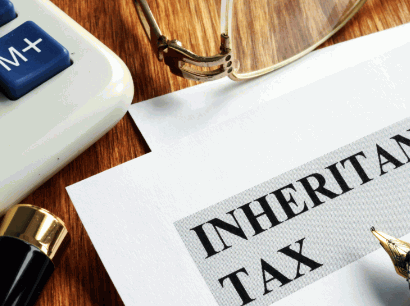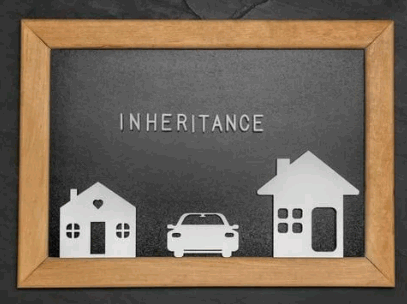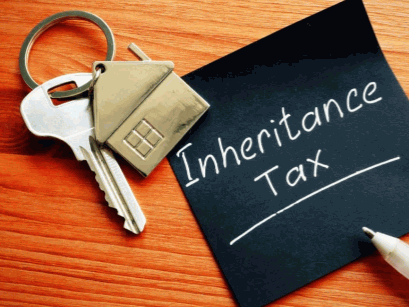



If you recently inherited property or anticipate doing so in the future, it's understandable that you've developed a sudden interest in Capital Gains Tax!
This tax has come as a shock to thousands of people who didn't realise the potential implications when inheriting a house from a loved one. In many cases, people aren't aware that they have to pay Capital Gains Tax at all, or they don't realise how much CGT they will have to pay.
However, you have an advantage; you're reading this blog now, which puts you ahead of the game! Not only will you learn all about your CGT liability, but you'll also discover methods of reducing your tax burden, and maybe even eliminating it altogether.
So, take a few minutes to read and digest the Prescient Accounting guide on avoiding Capital Gains Tax on inherited property in the UK, and you could save yourself a substantial amount of cash!

Think of CGT as a levy on the profit you make when you dispose of an asset, such as shares, property, or even valuable collectibles worth more than £3,000. It's essentially the difference between the purchase price and the disposal value. The government then takes a slice of that profit.
For example, if you buy or inherit a painting, coin collection, antique furniture, jewellery, etc., and you make a profit (gain) from selling or otherwise ‘disposing’ of it, you may be liable for CGT.

Thankfully, no! Everyone gets an annual Capital Gains Tax allowance which acts as a tax-free threshold. This was reduced from £12,500 to £6,000 in 2023, although the new rate will be £3,000 as of April 6, 2024.
As long as your total capital gains for the year stay below this amount, you won't owe any CGT. However, if your profits exceed the allowance, you'll only pay tax on the extra amount.
Inheriting something is a privilege, but it can also have tax implications. The good news is that inherited assets generally receive a helpful tax adjustment. Their value is considered to be their market value on the day you inherit them, which can significantly reduce the capital gain you'll pay if or when you eventually sell.

You'll need to bear with us, as CGT can be complicated. However, we'll do our best to explain it in everyday terms to avoid confusion...
The amount of CGT you pay on inherited property in the UK depends on a few factors:
Here's how the tax rate is applied:
As always, the tax people seem to enjoy making things as complex as possible, so let's try to explain how HMRC works things out...
Now, the confusing part!
They subtract your tax-free allowance from your taxable gains. This basically means they're treating some of your profit like regular income.
Then, they add this adjusted amount (taxable gains minus allowance) to your overall taxable income.
They're determining whether your total income, including the profit you made, falls within the basic rate tax band.
The basic band for income tax relates to your total earnings. If your total income for the tax year (including the adjusted profit) stays within this basic band, you might not pay any income tax on that profit.
Here's a simplified case study to illustrate the CGT process:
We can now move on to this step-by-step guide that breaks down the process...
Since the gain (£30,000) exceeds the annual allowance (£3,000), you will have a taxable amount.
The CGT payment deadline is sixty days after the completion of the sale. Otherwise, penalties will be applied by HMRC.
In this case study, you would owe £4,860 in Capital Gains Tax on the sale of the inherited house.
Now, that's almost five grand that you need to pay to the government. And if there's an ethical and legal means to avoid paying it, why shouldn't you take advantage of this?
After all, the above example is simplified, and there may be other costs incurred. Also, if the gain was more significant (say, around £70k), you're looking at a Capital Gains Tax bill of about £12,000 under the current rates.
With this in mind, we'll move on to discover how you can avoid Capital Gains Tax or reduce the amount...
When you make the inherited property your main or 'principal' residence, you can usually avoid paying Capital Gains Tax (CGT) on any profit you make if you decide to sell it later.
This is because of something called Private Residence Relief (PRR), which basically exempts your main home from CGT.
Check out: How To Avoid Paying VAT On Commercial Property

Even if you already own another property, you can only claim Private Residence Relief for one at a time.
You need to tell HMRC which property is your principal residence within two years of inheriting the new one, as this helps them keep track of things.
Take some time to seriously consider whether you want to live in the inherited property yourself.
If you do, then you need to officially make it your main home and notify HMRC within two years to claim PRR on any future sale.
Now, it might occur to you to advise HMRC that this is your main residence even if it's not. After all, how will they know?
However, in all seriousness, this is not a wise move!
HMRC normally wouldn't conduct a physical check to see if you're living at your principal residence when claiming Private Residence Relief (PRR). However, they do rely on evidence and have ways to assess your claim.
Essentially, there are five main criteria that you must meet in order to be successful:
The responsibility lies with you to demonstrate the property was your principal residence.
Here’s how the system works:
HMRC looks for evidence that you intended the property to be your main home. This could include things like:
While there's no set timeframe, very short periods of occupation might raise questions. Conversely, returning to the property after a temporary absence strengthens your claim.
There are situations where HMRC might investigate further, such as:
It's important to be truthful! Trying to deceive HMRC about your main residence can lead to penalties and tax charges. You’ll probably be fined, and you’ll be expected to pay the CGT you tried to avoid.
You also may face criminal prosecution for fraud, depending on the severity of the case.
CGT is only charged on the profit you make when selling personal possessions or assets, like property, worth £So, the closer the selling price is to the value of the property when you inherited it, the less likely you are to pay any tax.
If the property hasn't increased much in value since your inheritance, selling it quickly can be a good strategy. This minimises the potential "capital gain" (the difference between the selling price and inheritance value) and, therefore, the potential CGT liability.

Selling soon after inheritance can minimise CGT, but it's not always the best option. Weigh the potential tax benefit against the possibility of getting a better price if you wait.
Consider talking to a qualified surveyor to get an accurate valuation of the property and a property agent for market advice. This will help you decide the best time to sell and maximise your profit (or minimise your loss).
The beauty of transferring inherited property to your spouse is that you generally won't pay Capital Gains Tax. This applies regardless of how much the property's value has increased since you inherited it.
While you're off the hook for CGT, your spouse might have to pay it if they decide to sell the property later. The tax is calculated based on the difference between the selling price and the value of the property when it was transferred to them (not the inheritance value).
It's important to keep accurate records of the property's transfer value for future reference.
This tax relief applies to married couples or those in a civil partnership only.
Gifting it can be an option, but there are tax implications to consider:
Donating the inherited property to a registered charity in the UK is a great way to avoid Capital Gains Tax (CGT) altogether. Since charities don't pay CGT, the entire transaction is tax-free for you.
Gifting the property to a friend, family member, or other individual can be a generous gesture. However, the tax situation is a bit more complex:
In essence, if the property's value has increased since you inherited it, the recipient might face a higher CGT bill if they sell later.
Also, their base value for CGT purposes becomes the value at the time you gifted it, not the inheritance value.

Inherited property itself isn't subject to Inheritance Tax in the UK, whether it's rented out or used as a main residence. However, the property's value is included in your estate for tax purposes. This means it can affect whether the deceased person's estate owes Inheritance Tax.
Take a look at this breakdown:
So, if your estate, including the rented property, is below the nil rate band threshold, you will avoid Inheritance Tax. However, if the total value exceeds the threshold, the rented property's value contributes to the taxable amount.
It's also worth pointing out that you will need to pay income tax if you inherit a buy-to-let or holiday rental property once you begin to receive rental income.
So, now you have everything you need to tackle the thorny issues of Capital Gains Tax!
Hopefully, you can use this to avoid paying CGT or reducing the amount, but if you need further advice, our specialists are here to guide you.


We believe that the role of the accountant is much more than dealing with pure compliance. That’s why we’re offering a free video or telephone call with one of our team of chartered accountants, to give you straightforward and open dialogue about your tax and accounting affairs.